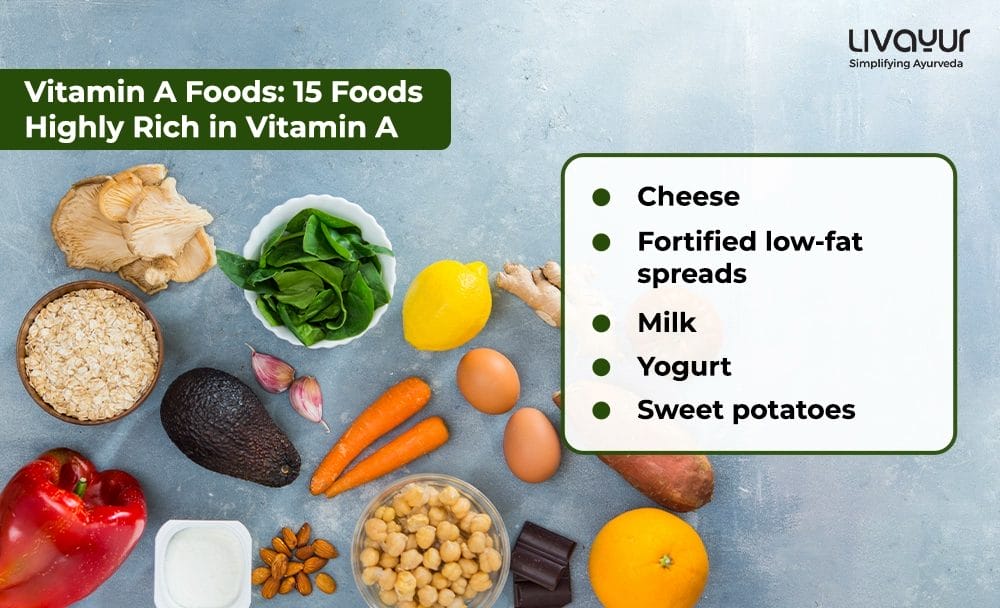
Ensuring a balanced diet is essential when it comes to maintaining good health. And when we talk about essential nutrients, vitamin A deserves the spotlight. It is a rich antioxidant that supports healthy vision, immune function, and cell growth.
Fortunately, obtaining your daily vitamin A dose doesn’t have to be daunting. Nature provides many delicious and nutritious foods packed with this essential nutrient. Whether you’re a fan of vibrant fruits and vegetables or enjoy the occasional indulgence in dairy products, there are several options to help you meet your vitamin A requirements.
This article dives into a comprehensive list of 15 vibrant foods rich in vitamin A. So, let’s uncover the delightful world of vitamin A-rich foods that promote good health.
Importance of vitamin A for the human body
Let’s delve into the reasons why this nutrient is crucial for the human body:
1. Helps the body’s natural defense against illness
Vitamin A is crucial for maintaining a robust and effective immune system. It supports the body’s natural defense mechanisms, helping prevent illnesses and infections. [1]
2. Helps the immune system work properly
Vitamin A plays a pivotal role in ensuring the proper functioning of the immune system. It helps regulate immune responses and promotes the development of immune cells, which contributes to an efficient and balanced immune system. [1]
3. Helps improve vision
Vitamin A is closely associated with maintaining good vision and eye health. It also helps prevent conditions such as night blindness and age-related macular degeneration, which can lead to vision loss. [1]
4. Keeps skin healthy
Our skin requires proper nourishment to stay healthy and radiant. Vitamin A contributes to maintaining the health and integrity of the skin. It promotes the production and maintenance of skin cells, ensuring their proper growth and renewal. [1]
Types of Vitamin A
The two main forms of vitamin A in the human diet are: [2]
- preformed vitamin A (retinol, retinyl esters), and
- provitamin A carotenoids such as alpha-carotene and beta-carotene that are converted to retinol
Animal products, fortified meals, and vitamin supplements are sources of preformed vitamin A. Plant-based diets naturally include carotenoids. Other forms of carotenoids, such as lutein, zeaxanthin, and lycopene, are present in food and do not convert to vitamin A but have advantageous effects on health.
15 vitamin A foods to consider
Here are 15 vitamin A foods you can consider:
1. Cheese
Indulge in a cheesy delight while boosting your vitamin A intake. Cheese, especially cheddar and mozzarella, provides a decent amount of this essential nutrient. Enjoy it in moderation, as cheese is also high in calories and saturated fat. [1]
2. Fortified low-fat spreads
Keep an eye out for low-fat spreads fortified with vitamin A. These spreads offer a convenient way to incorporate this essential nutrient into your diet. [1]
3. Milk
Not only does milk provide calcium for strong bones, but it also serves as a source of vitamin A. Whether you prefer whole milk or opt for the low-fat versions, a glass of milk can contribute to your daily vitamin A requirements. [1]
4. Yogurt
Creamy and tangy, yogurt is a delicious snack and a vitamin A powerhouse. Choose plain or Greek yogurt for a healthier option without added sugars. [1]
5. Spinach
This leafy green contains iron and is an excellent source of vitamin A. Whether sautéed or added to salads, spinach is a versatile option for boosting your vitamin A intake. [1]
6. Carrots
Crunchy and vibrant, carrots are well-known for their high vitamin A content. These orange beauties come with beta-carotene, a precursor to vitamin A. [1]
7. Sweet potatoes
Sweet potatoes add flavor to your plate and deliver significant vitamin A. Roast them, bake them into fries, or mash them as a healthier alternative to traditional potatoes. [1]
8. Red peppers
Add a color and vitamin A splash to your meals with red peppers. These peppers are sweet, crunchy, and a great source of this essential nutrient. [1]
9. Mango
Bursting with tropical sweetness, mangoes offer a delicious way to increase your vitamin A intake. Enjoy fresh, blend them into smoothies, or incorporate them into fruit salads for a refreshing treat. [1]
10. Papaya
This tropical fruit adds a tropical twist to your palate and provides a healthy dose of vitamin A. Enjoy its luscious flavor and reap the benefits of this essential nutrient. [1]
11. Apricots
Bite into these velvety fruits to satisfy your sweet tooth and boost your vitamin A levels. Dried apricots are a convenient option, while fresh apricots make a delightful addition to desserts and salads. [1]
12. Kale
As a nutrient powerhouse, kale deserves a spot on the list of vitamin A-rich foods. This leafy green comes with various vitamins and minerals, including vitamin A. [1]
13. Broccoli
Packed with vitamins and antioxidants, broccoli is a versatile vegetable with a good amount of vitamin A. Steam, roast, or add it to stir-fries and pasta dishes for a healthy and colorful meal. [2]
14. Pumpkin
Enjoy the rich flavor and vibrant hue of pumpkin, a seasonal vegetable also a great source of vitamin A. From soups and stews to roasted dishes and desserts, pumpkin adds taste and nutritional value to various recipes.[2]
15. Tomatoes
These juicy red fruits are tasty and provide a moderate amount of vitamin A. Enjoy them in salads, sauces, or topping on pizzas and sandwiches to add flavor and nutrients to your meals. [2]
Vitamin A requirements for individuals
Vitamin A content in food is commonly measured in micrograms (µg/mcg) of retinol equivalents (RE). You can typically obtain all the necessary vitamin A from your regular diet. Here are the recommended dietary allowance of Vitamin A, in both men and women: [1]
| Age | Men | Women |
| 19 years & above | 900 mcg [3000 IU] | 700 mcg [2333 IU] |
| During pregnancy | – | Up to 10,000 IU vitamin A daily dose for a minimum of 12 weeks during pregnancy, until delivery OR Up to 25,000 IU vitamin A weekly dose |
For children, this is the recommended dosage
| Target age group | Oral dose | Frequency | Route of administration |
| 6–11 months | 100,000 IU | Once | Oral liquid, oil-based preparation of retinyl palmitate or retinyl acetate |
| 12–59 months | 200,000 IU | Every 4–6 months | Oral liquid, oil-based preparation of retinyl palmitate or retinyl acetate |
Symptoms of Vitamin A deficiency
Mild vitamin A deficiency may cause fatigue, susceptibility to infections, and infertility. In case of severe deficiency, these are the signs to lookout for: [2]
- Xerophthalmia, a severe dryness of the eye that if untreated, can lead to blindness
- Nyctalopia or night blindness
- Irregular patches on the white of the eyes
- Dry skin or hair
Ayurveda and vitamin A
Ayurveda recognizes the importance of nutrition in maintaining overall health and well-being. According to Ayurvedic principles, a balanced diet should include fruits, vegetables, and herbs that provide essential nutrients, including vitamin A.
Ayurveda also emphasizes the importance of proper digestion and assimilation of nutrients. It teaches that an individual’s digestive fire, known as Agni, should be vital to ensure optimal absorption and utilization of nutrients. Ayurvedic practices, such as mindful eating, herbal supplementation, and lifestyle adjustments, are recommended to enhance digestion and support the body’s ability to absorb and derive maximum benefits from the nutrients consumed.
FAQs
1. How to overcome vitamin A deficiency?
To overcome vitamin A deficiency, it is crucial to incorporate vitamin A-rich foods into your diet. Focus on consuming carrots, spinach, sweet potatoes, mangoes, and dairy products. In some cases, vitamin A supplements may be recommended under the guidance of a healthcare professional.
2. What are the best vitamin A sources?
The best sources of vitamin A include dairy products like milk, cheese, and eggs. Plant-based sources include carrots, sweet potatoes, spinach, kale, broccoli, mangoes, and papaya.
3. What are some vitamin A-rich foods?
Some vitamin A-rich foods include carrots, sweet potatoes, spinach, kale, broccoli, mangoes, papaya, apricots, milk, and cheese.
4. What are vitamin A benefits?
Vitamin A supports healthy vision, plays a vital role in maintaining a robust immune system, promotes healthy cell growth and development, and keeps the skin healthy.
Conclusion
Incorporating vitamin A foods into your diet is a simple way to support your health. The 15 foods highlighted in this article offer a range of delicious options abundant in this essential nutrient. By ensuring an adequate intake of vitamin A, you can enhance your vision, strengthen your immune system, promote healthy cell growth, and maintain vibrant skin.
Remember, a balanced diet that includes a variety of nutrient-rich foods is vital to reaping the benefits of vitamin A and supporting your body’s optimal functioning. So, embrace the rainbow of colorful fruits, vegetables, and other vitamin A-rich foods and savor their nutritional goodness.
Disclaimer
The information provided here is not intended to replace professional advice or treatment.


















